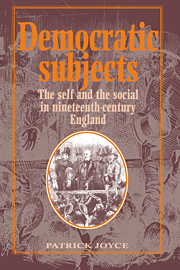Book contents
- Frontmatter
- Contents
- List of plates
- Acknowledgements
- Introduction
- Part One The sorrows of Edwin Waugh: a study in ‘working-class’ identity
- Part Two John Bright and the English people: a study in ‘middle-class’ identity
- 7 Plain man's prophecy
- 8 Speaking Bright
- 9 Making the self
- 10 Bright makes the social
- 11 Creating the democratic imaginary
- Part Three Democratic romances: narrative as collective identity in nineteenth-century England
- Appendices
- Index
9 - Making the self
Published online by Cambridge University Press: 10 December 2009
- Frontmatter
- Contents
- List of plates
- Acknowledgements
- Introduction
- Part One The sorrows of Edwin Waugh: a study in ‘working-class’ identity
- Part Two John Bright and the English people: a study in ‘middle-class’ identity
- 7 Plain man's prophecy
- 8 Speaking Bright
- 9 Making the self
- 10 Bright makes the social
- 11 Creating the democratic imaginary
- Part Three Democratic romances: narrative as collective identity in nineteenth-century England
- Appendices
- Index
Summary
RELIGION
A good deal of the public myth of Bright was constructed out of what contemporaries took to be the marginality of his position as the wealthy, established son of a man who had known poverty at first hand and was of ‘humble’ origin. To the extent that his oratory expressed a view of the man as voicing the moral law, and hence passions and feelings common to all people, Bright can be seen as producing a public self that corroborated this cult, the Bright of history. If history's Bright was constructed out of his assumed marginality, his private self was constructed out of religion, out of the Quakerism that was the most important element in his formation. For, if Bright was ‘socially marginal’, he was also religiously marginal: he spanned the old dispensation of Quakerism and the new, the quietism of the eighteenth century and the Evangelicalism of the nineteenth, being not quite completely of either. This religious outlook can be seen as expressing his indeterminate social position. The historian of Victorian Quakerism has observed that the quietist indictment of the Evangelical current in Quakerism was as much social as theological. What was objected to in the new emphasis on engagement with the world in order to save souls for God was the worldliness believed to be initiated by the change, a fear of the world not unconnected with the increasing wealth and status of Quakers in the early part of the century.
- Type
- Chapter
- Information
- Democratic SubjectsThe Self and the Social in Nineteenth-Century England, pp. 104 - 123Publisher: Cambridge University PressPrint publication year: 1994



